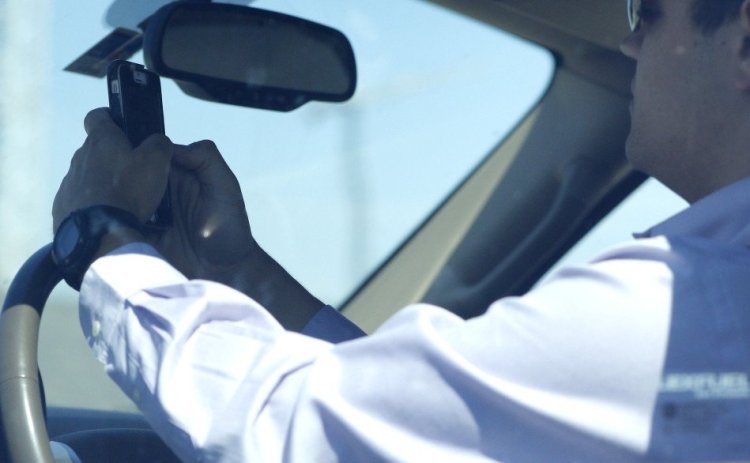A lawmaker is proposing a bill that would impose a mandatory 90-day license suspension for texting while driving, arguing that the current law against texting behind the wheel hasn’t done enough to stem the growing problem of distracted driving.
Members of the Legislature’s Joint Standing Committee on Transportation heard arguments for and against the bill Tuesday during a public hearing where lawmakers also heard testimony on a proposal to tighten rules for teen drivers.
Rep. Stephen Stanley, D-Medway, sponsored L.D. 120 to increase the penalty for texting and driving. A 2011 state law prohibits drivers from reading or typing email or text messages. Violating the law results in a $250 fine. A 30-day license suspension can be imposed for a second violation, and additional violations can result in a 60- or 90-day suspension.
But Stanley said the existing penalties are not strong enough.
“It’s getting to be a problem out there,” he said. “I think this is going to make the road safer for people like you and I who want to jump in their cars and drive home.”
Even though texting and driving can be difficult for police to prove, it is a serious safety problem, Stanley said.
As of last year, Maine State Police had cited 2,848 drivers, including 23 repeat offenders, for texting behind the wheel since the law took effect. The number has grown from 48 in 2011 to 866 last year.
Dan Burke, a former airline pilot from Freeport, told the committee that distractions from electronic devices are just as dangerous as drinking and driving, and that texting while driving should carry a stiffer penalty than allowed under the current law.
“We all know texting is bad, it takes your eyes off the road, it is astounding to me anyone thinks it is a good idea,” Burke said. “It is illegal and it is plain dangerous.” The number of fatalities and injuries caused by media-induced driver inattention is large and increasing, he added.
“They are not just killing themselves, they are putting everyone at risk,” Burke said. “It is becoming a public health crisis.”
But Oamshri Amarasingham, advocacy director for the American Civil Liberties Union of Maine, said a mandatory punishment could hurt many Mainers’ ability to meet basic needs such as driving to work, school or the grocery store.
“I appreciate it is a really difficult problem to tackle, but we don’t think this is the way to address it,” Amarasingham said.
Committee members heard more contentious testimony regarding L.D. 711. The bill would extend the time a person under 21 must hold a driver learner’s permit from six months to 12 months, prohibit teens from driving unsupervised with other teens and shorten the hours a teen can drive at night.
Carl Joy, from the Maine Driver and Safety Education Association, said the intent of the bill is to provide more road safety for teens, who are at higher risk for vehicle collisions that cause injury and death.
“They do not perceive risk the same way as a mature brain, that is why (graduated drivers licenses) help so much to reduce crashes around our state and the nation,” Joy said.
Under current law, Maine residents under 18 can get an intermediate license that allows them to drive only if a licensed member of their immediate family is in the car and prohibits them from driving between midnight and 5 a.m. Exceptions to immediate family members include foreign exchange students living with the family and a person, including a child of a military parent, who is under the guardianship of an immediate family member.
Joy’s organization would instead like to prohibit intermediate drivers from carrying any passengers under age 21 unless someone who is at least 25 years old is also in the car, Joy said. The chance of an accident goes up if teens are driving with other teens, but drops if teens drive with an adult, he said. Preventing teens from driving between 9 p.m. and 5 a.m. could reduce collisions because more crashes happen at night, Joy said. The bill gives intermediate drivers who are employed an extra hour, but they still would not be able to drive from 10 p.m. to 5 a.m.
Extending the duration of a learner’s permit to a year would make sure novice drivers experience all four seasons on the road, said Bob Mullen, a driving instructor from Poland Spring.
“If one is going to remain in Maine, learning with supervision makes a lot of sense, especially when driving on black ice for the first time,” he said.
But the bill is opposed by some other driving teachers and the state Bureau of Motor Vehicles.
Patty Morneault, deputy secretary of state for the bureau, said the bill could create complications for people 18 years or older who are trying to get their driver’s license. Making those people wait another six months to take a driver’s test could interfere with their ability to find employment or enlist in the military, Morneault said. The state’s current rules for learner’s permits and intermediate restrictions are in line with federal recommendations, she added.
Other opponents said the nighttime driving restrictions would make it harder for teens to find jobs and get home after school events and games.
There are actually more crashes early in the evening than there are in the middle of the night, said Harry Epp, owner of Katahdin Driving Academy in Millinocket.
“Kids are actually safer driving home after midnight by themselves,” Epp said. “I urge you to reject L.D. 711 in its entirety.”
Opponents also criticized another aspect of the bill that would require the state to adopt and implement a standardized driver education curriculum and use textbooks developed by a nationwide automobile association, like AAA’s “How to Drive.”
“I like the book,” Epp said, “I just don’t want it shoved down my throat.”
The transportation committee did not vote Tuesday and will hold a later work session to deliberate the bills.
Peter McGuire can be contacted at 791-6325 or at:
Copy the Story LinkSend questions/comments to the editors.





Success. Please wait for the page to reload. If the page does not reload within 5 seconds, please refresh the page.
Enter your email and password to access comments.
Hi, to comment on stories you must . This profile is in addition to your subscription and website login.
Already have a commenting profile? .
Invalid username/password.
Please check your email to confirm and complete your registration.
Only subscribers are eligible to post comments. Please subscribe or login first for digital access. Here’s why.
Use the form below to reset your password. When you've submitted your account email, we will send an email with a reset code.